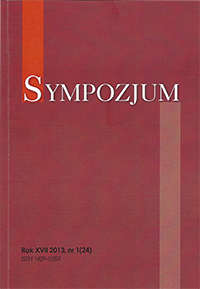Ład moralny a pokój światowy
The Moral Order and the World Peace
Author(s): Witold KaweckiSubject(s): Christian Theology and Religion, Social Sciences, Sociology, Theology and Religion
Published by: Wyższe Seminarium Misyjne Księży Sercanów
Keywords: peace;morality;social order;
Summary/Abstract: When analysing the encyclical Pacem in Terris from the perspective of 50 years after its promulgation, the emphasis should be put on existing and still valid implications between the moral order and the issue of peace. These refer mainly to the economic, political and international cooperation. John XXIII stressed the point that every Christian in his own conscience is bound to engage in the cause of peace and civilization. He opted for the responsible religious and moral culture in order to bridge the existing gap between the religious faith and the conduct of individuals. The Pope advocated the formation of a true culture of business, with due consideration given to human dignity. By that means the theological character is assigned to the economy in the sense that faith perceives the economic activity in the perspective of the dynamism of salvation. Recognizing the need for an axiologication of politics, the Pope called for practicing a political culture in which the culture of solidarity would constitute an integral part of international cooperation, and hence it would lead to tangible benefits both on the economic, social and political level and on that of healthcare and physical development. According to John XXIII, the formation of international solidarity and culture of peace is a duty of ruling authorities. Peace is supposed to inspire and to drive human beings and nations in the direction of tolerance and of universal solidarity, which in turn is based inevitably on the moral order.
Journal: Sympozjum
- Issue Year: 24/2013
- Issue No: 1
- Page Range: 73-93
- Page Count: 21
- Language: English, Polish

